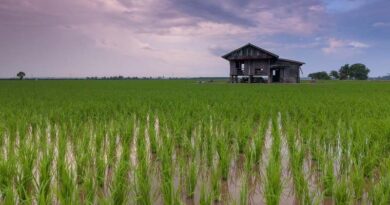
NABARD and CEEW Join Hands To Advance Climate-resilient Agriculture And Sustainable Livelihoods In Rural India
01 November 2025, New Delhi: The National Bank for Agriculture and Rural Development (NABARD) signed a Memorandum of Understanding (MoU) with the Council on Energy, Environment and Water (CEEW) to strengthen climate-resilient agriculture, scale up green rural financing, and promote sustainable livelihoods across India’s rural economy. By combining innovation, investment, and institutional capacity, NABARD and CEEW aim to create scalable and inclusive models of rural climate action that help farmers and small enterprises adapt to changing climate conditions while supporting sustainable economic growth.
The collaboration brings together NABARD’s nationwide financial network and CEEW’s analytical and policy expertise to accelerate India’s transition toward a greener, more resilient rural economy. The partnership will support diversified livelihood pathways, including climate-resilient agriculture, decentralised renewable energy (DRE) enterprises, sustainable forestry and agroforestry, and rural MSME ventures linked to the green economy. It will also strengthen digital public infrastructure, expand access to innovative financial instruments, and mobilise green capital through voluntary carbon and rural carbon markets.
NABARD Chairman Shaji K. V said, “This collaboration with CEEW will enable us to integrate advanced data systems and climate-resilient tools into our institutional ecosystem. Together, we aim to develop scalable solutions for climate-resilient agriculture, expand access to green finance, and enhance the adaptive capacity of India’s farmers and rural enterprises.”
CEEW Founder-CEO Arunabha Ghosh said, “Through this partnership with NABARD, we will build data-driven and technology-enabled systems that empower farmers, green rural enterprises, and local institutions to thrive in a changing climate. The collaboration will also help mainstream new financial tools—from parametric insurance to voluntary carbon markets—anchored in transparency, inclusion, and resilience. By strengthening institutional capacity and local leadership, we can ensure that climate resilience is built from the ground up and sustained for the long term.”
The MoU marks a significant step toward placing climate-resilient agriculture at the core of India’s rural development strategy, with livelihoods and the green economy as the driving force, and green finance and carbon markets as key enablers. NABARD has established a dedicated Department of Climate Action and Sustainability (DCAS) to guide its efforts and has initiated projects focused on climate-proofing watershed investments and integrating carbon finance into agricultural value chains. CEEW’s research highlights the importance of institutional capacity, technology access, and financing as essential factors for scaling climate-resilient agriculture.
📢 If You’re in Agriculture, Make Sure the Right People Hear Your Story.
From product launches to strategic announcements, Global Agriculture offers unmatched visibility across international agri-business markets. Connect with us at pr@global-agriculture.com to explore editorial and advertising opportunities that reach the right audience, worldwide.






